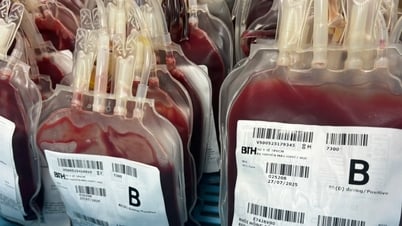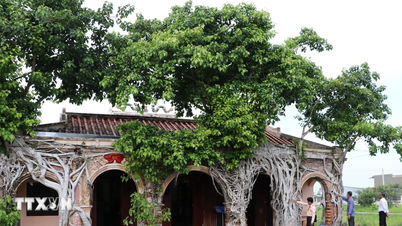On July 7, Children's Hospital 2, Ho Chi Minh City announced that it had successfully performed a kidney transplant for a child with end-stage chronic kidney failure who had a mutation in the Wilms-1 (WT1) tumor suppressor gene.
WT1 gene mutations are the cause of many different diseases, including nephrotic syndrome leading to kidney failure. This is the first kidney transplant at Children's Hospital 2 for a child with end-stage chronic kidney failure due to a rare WT1 gene mutation.
The patient is an 11-year-old girl living in Lam Dong province who was diagnosed with drug-resistant nephrotic syndrome and did not respond to conventional immunosuppressive drugs, leading to end-stage renal failure in 2020. Since then, the patient has had to undergo dialysis 3 times a week at Children's Hospital 2, and after a while, she was transferred to peritoneal dialysis.
Associate Professor, Doctor, Doctor Huynh Thi Vu Quynh, Head of the Department of Nephrology and Endocrinology, Children's Hospital 2 said that if the kidney is not replaced, the child will have to undergo hemodialysis or peritoneal dialysis for life.
Having to undergo dialysis three times a week at the hospital greatly affects the patient's quality of life. The girl cannot go to school or play like her peers; not to mention the family's finances are also affected because the parents have to take time off work to take the child for long-term dialysis.
After many consultations, the Kidney Transplant Committee of Children's Hospital 2 considered a kidney transplant for the patient from a relative's donated kidney. Because this was a special case, the doctors clearly identified the risk factors as well as planned specific surgical steps for this patient.
On July 1, doctors transplanted a kidney from her biological mother into the girl’s right iliac fossa. Before that, the girl’s right kidney had been completely removed.
According to Dr. Pham Ngoc Thach, Deputy Director of Children's Hospital 2, children who had previously received kidney transplants at Children's Hospital 2 did not need to have their kidneys removed completely. However, in this case, the surgical team performed a radical right kidney removal first to avoid the risk of kidney and gonad cancer due to WT1 gene mutation, and then performed a new kidney transplant for the child. The left kidney and left gonad will be treated at a later stage, after the child has stabilized after the kidney transplant.
Seven days after the kidney transplant, the patient is now temporarily stable, eating normally and being monitored at the Department of Nephrology and Endocrinology. Doctors said that when the child reaches puberty, he will be given testosterone replacement hormone to help him develop secondary sexual characteristics and improve his quality of life.
Doctor Pham Ngoc Thach added that the WT1 gene is a Wilms tumor suppressor gene (nephroblastoma) that plays a role in the differentiation of the gonads from the initial gonadal buds during the fetal period.
The WT1 gene also participates in the kidney structure. Mutations in the WT1 gene can cause many different diseases, including nephrotic syndrome leading to kidney failure.
Children with WT1 mutations are at high risk of developing Wilms tumor and gonadal cancer because the gonads are not fully differentiated and dysplastic.
“Detecting gene mutations is of great value in the treatment of children with drug-resistant nephrotic syndrome, especially children who are indicated for kidney transplantation. Therefore, children diagnosed with drug-resistant nephrotic syndrome need to have their genes tested early,” Dr. Pham Ngoc Thach emphasized./.
Source: https://www.vietnamplus.vn/ghep-than-thanh-cong-cho-benh-nhi-suy-than-man-giai-doan-cuoi-co-dot-bien-gen-post1048421.vnp



![[Photo] Many people eagerly await the preliminary review despite heavy rain](https://vphoto.vietnam.vn/thumb/1200x675/vietnam/resource/IMAGE/2025/8/27/4dc782c65c1244b196890448bafa9b69)

![[Photo] Brilliant red of the exhibition 95 years of the Party Flag lighting the way before the opening](https://vphoto.vietnam.vn/thumb/1200x675/vietnam/resource/IMAGE/2025/8/27/e19d957d17f649648ca14ce6cc4d8dd4)
![[Photo] Prime Minister Pham Minh Chinh chairs meeting of National Steering Committee on International Integration](https://vphoto.vietnam.vn/thumb/1200x675/vietnam/resource/IMAGE/2025/8/26/9d34a506f9fb42ac90a48179fc89abb3)




![[Photo] Following the soldier handling toxic chemicals left over from the war](https://vphoto.vietnam.vn/thumb/402x226/vietnam/resource/IMAGE/2025/8/25/74d8eb235bd64b389457fa2cfc785aac)
























































![[Photo] General Secretary To Lam attends Meeting with generations of National Assembly deputies](https://vphoto.vietnam.vn/thumb/402x226/vietnam/resource/IMAGE/2025/8/27/a79fc06e4aa744c9a4b7fa7dfef8a266)

































Comment (0)